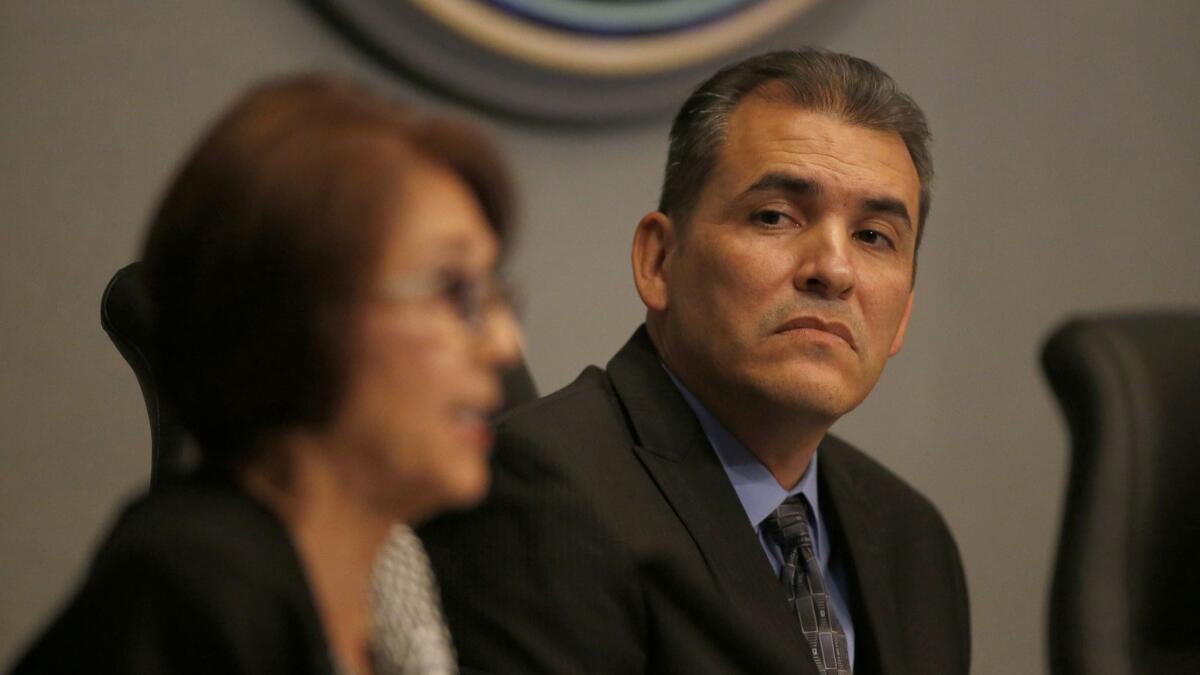Disney appears to gain a friendly majority in Anaheim City Council. The ‘living wage’ initiative is still too close to call

- Share via
After butting heads for two years with the Anaheim City Council, Walt Disney Co. appears to have won a favorable majority on the panel as candidates backed by the media giant were well ahead in a wide field of hopefuls.
Three City Council candidates, including the mayor, who received campaign support from Disney are leading in an election that centered on whether the company’s popular theme park resort — Anaheim’s largest employer — is paying enough tax to the city and offering workers fair salaries.
The three leading candidates will join a fourth Disney supporter next year on the seven-member council.
Anaheim voters, however, were split on a “living wage” initiative that would require hospitality businesses that accept a city tax subsidy to pay hourly wages of at least $15. Measure L was leading by about 500 votes Wednesday.
Disney said it would hold off commenting on the outcome of the race until official results are announced by the Orange County registrar of voters. As many as 418,600 ballots remained outstanding countywide Wednesday.
Disney, through Disney Worldwide Services, donated at least $1.6 million to candidates and city ballot measures, according to campaign reports for donations made before Oct. 25. Before the living wage initiative qualified for the ballot in June, Disney donated heavily to defeat the measure.
Disney was outspent by labor unions, led by Unite Here Local 11, which represents hotel workers in Anaheim. The labor groups spent at least $1.9 million, most of it in support of Measure L.
Disney contributed $2,000 to the campaign of Harry Sidhu, a businessman and former mayor pro tem who had a sizable lead in the race to replace Mayor Tom Tait, an ardent Disney critic who has to step down because of term limits.
But Sidhu said the donations do not make him beholden to Disney.
“I was elected by the voters, and no one else, because they knew I was the only candidate who could bring this city together, end the divisiveness and improve the quality of life for every resident,” he said. “The best way we can do that is to make sure we take the huge tax revenue generated from our Resort District and spend it in the neighborhoods.”
Disney also made donations of about $1.2 million to a slate of council candidates including Jordan Brandman, an educator and businessman who was leading over another Disney critic, Councilman James Vanderbilt. Also on the Disney-supported slate was Trevor O’Neil, the owner of an in-home care service company who was leading in the race to replace Disney supporter Kris Murray, who is also being forced out by term limits.
If the final election results follow Wednesday’s voting trends, Sidhu, O’Neil and Brandman are expected to join strong Disney advocate Councilwoman Lucille Kring to form a pro-Disney majority. Kring has two more years on her term.
Meanwhile, Councilman Jose Moreno, an ardent critic of the Disneyland Resort, had a sizable lead Wednesday in his reelection bid.
The ballot initiative that would require hospitality businesses that accept a tax subsidy from Anaheim to pay workers a living wage was slightly ahead in the polls Wednesday morning. Unions representing Disneyland Resort workers collected the signatures to put the measure on the ballot.
Union leaders said the support by Anaheim voters for Measure L suggests residents are sympathetic to the plight of resort workers who are struggling to make ends meet.
“I think they know that employees must be compensated in a better way,” said Ada Briceno, co-president of Unite Here Local 11, one of the unions representing workers at the resort.
If approved, the measure would require hospitality companies that get a tax break from Anaheim to pay an hourly wage of at least $15 starting in January, increasing $1 an hour each year until 2022, when the wage would be tied to the cost of living.
But opponents of the initiative — headed by the Anaheim Chamber of Commerce — said too many outstanding ballots are left to be counted to determine voter intent. Campaigning against Measure L, they said the extra cost of paying higher wages will scare off new development projects in the city.
Todd Ament, chief executive of the Anaheim Chamber of Commerce, said he and other opponents “are confident that in the end the results will show that voters saw through the misleading campaign of the special interests pushing Measure L and said no to this bad deal for our city.”
Supporters and opponents of the measure disagree on whether the initiative applies to the Disneyland Resort, which ended two tax subsidy agreements with the city this year.
But the resort continues to benefit from a 1996 agreement in which Anaheim sold 40-year bonds to build a $108-million parking garage that is used by the resort and generates more than $35 million a year for Disney. The bond is being paid off with taxes collected mostly from Disney but also from bed taxes from hotels throughout the city.
Anaheim City Atty. Robert Fabela has said that he doesn’t believe the bond agreement qualifies as a tax subsidy and that therefore Measure L does not apply to the resort. Supporters of Measure L disagree, saying the bond measure fits the definition of a tax break.
Union leader Briceno said she expects that the debate over whether the initiative applies to the resort will ultimately be decided in a courtroom.
“We have plaintiffs ready to go and we have attorneys ready to litigate,” she said.
To read more about the travel and tourism industries, follow @hugomartin on Twitter.
More to Read
Inside the business of entertainment
The Wide Shot brings you news, analysis and insights on everything from streaming wars to production — and what it all means for the future.
You may occasionally receive promotional content from the Los Angeles Times.











